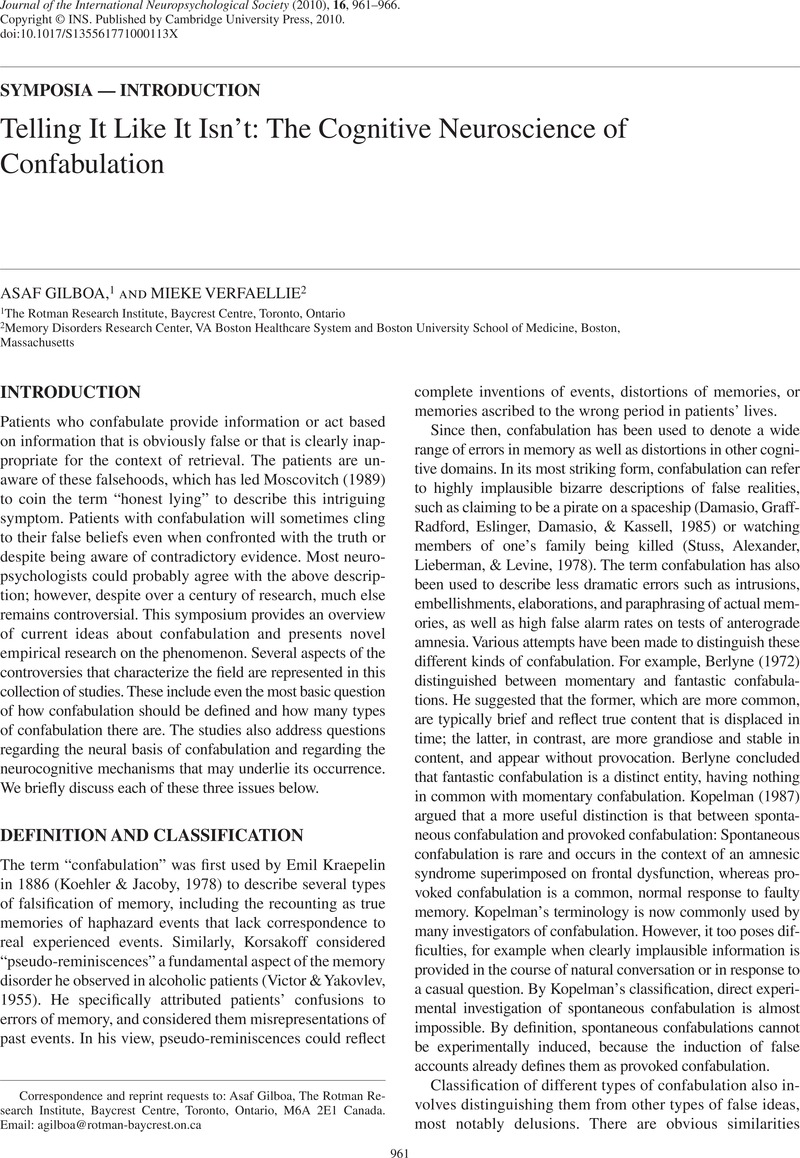Crossref Citations
This article has been cited by the following publications. This list is generated based on data provided by Crossref.
Race, Elizabeth
and
Verfaellie, Mieke
2012.
Remote Memory Function and Dysfunction in Korsakoff’s Syndrome.
Neuropsychology Review,
Vol. 22,
Issue. 2,
p.
105.
Oscar-Berman, Marlene
2012.
Function and Dysfunction of Prefrontal Brain Circuitry in Alcoholic Korsakoff’s Syndrome.
Neuropsychology Review,
Vol. 22,
Issue. 2,
p.
154.
Rasmussen, Katrine W.
2013.
The role of the hippocampus and prefrontal cortex in imagining the future: Insights from studies of patients with focal brain lesions.
Nordic Psychology,
Vol. 65,
Issue. 2,
p.
166.
Rosenbaum, R. Shayna
Gilboa, Asaf
and
Moscovitch, Morris
2014.
Case studies continue to illuminate the cognitive neuroscience of memory.
Annals of the New York Academy of Sciences,
Vol. 1316,
Issue. 1,
p.
105.
Maguire, Eleanor A.
2014.
Memory consolidation in humans: new evidence and opportunities.
Experimental Physiology,
Vol. 99,
Issue. 3,
p.
471.
Ghosh, Vanessa E.
Moscovitch, Morris
Melo Colella, Brenda
and
Gilboa, Asaf
2014.
Schema Representation in Patients with Ventromedial PFC Lesions.
The Journal of Neuroscience,
Vol. 34,
Issue. 36,
p.
12057.
Shakeel, Mohammed K.
and
Docherty, Nancy M.
2015.
Confabulations in schizophrenia.
Cognitive Neuropsychiatry,
Vol. 20,
Issue. 1,
p.
1.
Cox, Rochelle E.
and
Barnier, Amanda J.
2015.
A Hypnotic Analogue of Clinical Confabulation.
International Journal of Clinical and Experimental Hypnosis,
Vol. 63,
Issue. 3,
p.
249.
Bouzerda-Wahlen, Aurélie
Nahum, Louis
Liverani, Maria Chiara
Guggisberg, Adrian G.
and
Schnider, Armin
2015.
An Electrophysiological Dissociation between Orbitofrontal Reality Filtering and Context Source Monitoring.
Journal of Cognitive Neuroscience,
Vol. 27,
Issue. 1,
p.
164.
Hebscher, Melissa
and
Gilboa, Asaf
2016.
A boost of confidence: The role of the ventromedial prefrontal cortex in memory, decision-making, and schemas.
Neuropsychologia,
Vol. 90,
Issue. ,
p.
46.
Yeo, Sang-Seok
2016.
Confabulation Following Injury of the Papez Circuit as a Result of Middle Cerebral Artery Infarction: A Diffusion Tensor Tractography Study.
Journal of the Korean Proprioceptive Neuromuscular Facilitation Association,
Vol. 14,
Issue. 1,
p.
41.
Hebscher, Melissa
Barkan-Abramski, Moran
Goldsmith, Morris
Aharon-Peretz, Judith
and
Gilboa, Asaf
2016.
Memory, Decision-Making, and the Ventromedial Prefrontal Cortex (vmPFC): The Roles of Subcallosal and Posterior Orbitofrontal Cortices in Monitoring and Control Processes.
Cerebral Cortex,
Vol. 26,
Issue. 12,
p.
4590.
Moscovitch, Morris
Cabeza, Roberto
Winocur, Gordon
and
Nadel, Lynn
2016.
Episodic Memory and Beyond: The Hippocampus and Neocortex in Transformation.
Annual Review of Psychology,
Vol. 67,
Issue. 1,
p.
105.
Jang, Sung Ho
and
Yeo, Sang Seok
2016.
Injury of the Papez circuit in a patient with provoked confabulation following subarachnoid hemorrhage: a diffusion tensor tractography study.
Acta Neurologica Belgica,
Vol. 116,
Issue. 4,
p.
655.
Gilboa, Asaf
and
Moscovitch, Morris
2017.
Ventromedial prefrontal cortex generates pre-stimulus theta coherence desynchronization: A schema instantiation hypothesis.
Cortex,
Vol. 87,
Issue. ,
p.
16.
Bajo, Ana
Fleminger, Simon
Metcalfe, Chris
and
Kopelman, Michael D.
2017.
Confabulation: What is associated with its rise and fall? A study in brain injury.
Cortex,
Vol. 87,
Issue. ,
p.
31.
Mendez, Mario F.
2019.
Frontolimbic affective bias and false narratives from brain disease.
Medical Hypotheses,
Vol. 128,
Issue. ,
p.
13.
Drost, Rolinda
Postma, Albert
and
Oudman, Erik
2019.
Cognitive and affective theory of mind in Korsakoff’s syndrome.
Acta Neuropsychiatrica,
Vol. 31,
Issue. 03,
p.
128.
Khan, Danish M.
Kamel, Nidal
Muzaimi, Mustapha
and
Hill, Timothy
2021.
Effective Connectivity for Default Mode Network Analysis of Alcoholism.
Brain Connectivity,
Vol. 11,
Issue. 1,
p.
12.
Francis, Cheryl
MacCallum, Fiona
and
Pierce, Siân
2022.
Interventions for confabulation: A systematic literature review.
The Clinical Neuropsychologist,
Vol. 36,
Issue. 8,
p.
1997.





